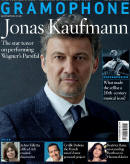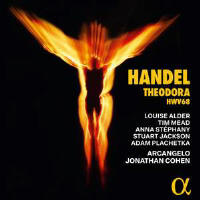Texte paru dans: / Appeared in: |
|
 |
Outil de traduction |
|
‘More prescient and pertinent with every performance’ is how Ruth Smith describes Theodora in a typically astute booklet note for this latest recording by Jonathan Cohen and the singers and instrumentalists of Arcangelo. It is hard to disagree with that. Eighteen years after Peter Sellars and William Christie staged Handel’s penultimate oratorio at Glyndebourne and revealed what had often been dismissed as a pious and dull work to be one of its composer’s greatest dramatic creations, the now rehabilitated masterpiece’s growing number of presentations continues to advertise its light, depth and relevance. Quite simply, the more we come to know this compassionate, noble and sincere depiction of early Christian martyrdom the better it gets.
Such is the impression, at any rate, left by Cohen’s reading, which benefits from vivid recorded sound and a strong, even cast. I mention the sound first because one thing you notice immediately is how bright and present the choir and orchestra are, bringing their combination of force, richness and clarity right into the midst of the drama, yet without overpowering it. For Christie’s studio recording the choir of Les Arts Florissants, though no less expertly moulded by their dramatically instinctive conductor, sound muffled and distant by comparison (and with that somewhat uninvolved), while Paul McCreesh’s finely set-up Gabrieli Consort are a touch plain and cold; the balance of Cohen’s vigorously confident singers and players allows him to make his ensemble a major character in the story.
The soloists also play their parts, led by Louise Alder as the death-welcoming Theodora, not quite as intimately drawn as the fearful, vulnerable Sophie Daneman for Christie, the more fatalistically troubled Susan Gritton for McCreesh, or indeed her own Semele for John Eliot Gardiner and Cleopatra for Theater an der Wien’s Giulio Cesare, but nevertheless providing a compelling and radiant Handelian vocal performance that marks her out as the work’s worthy still centre. Anna Stéphany as her friend Irene is a mezzo whose dark firmness commands attention in some of the oratorio’s best arias, though some may find her vibrato a little too insistent and she faces strong competition in the role, not least from the unforgettable Lorraine Hunt Lieberson with Christie at Glyndebourne, and Joyce DiDonato on an otherwise inconsistent recent recording from Maxim Emelyanychev. Tim Mead as Theodora’s selfless admirer Didymus is his usual Rolls-Royce of a countertenor, depth and warmth joining with rock-steady phrasing and definition, and Czech bass-baritone Adam Plachetka is an angry, in places slightly unhinged Roman governor Valens (with notably good English, too). Stuart Jackson doesn’t always sound entirely comfortable with his vocal placing as the sympathetically onlooking Roman captain Septimius, but brings an open and unaffected humanity to the role.
From all this, Cohen sculpts an attractive and cohesive whole – dramatically responsive, well paced (the timing between numbers is spot on) and with plenty of musical richness and detail. Christie’s wise stagecraft and McCreesh’s lighter, clear-eyed vision make their versions valid still, but this newcomer comfortably joins them as a strong recommendation. |
|




